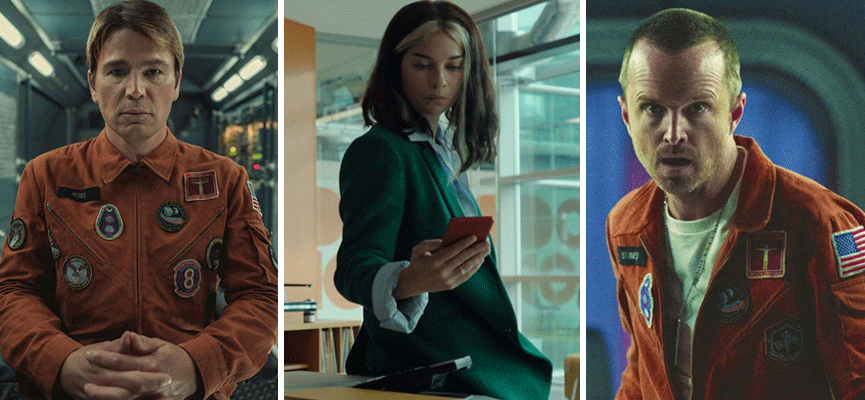The highly anticipated sixth season of Black Mirror has finally arrived, and creator Charlie Brooker has once again delivered a thought-provoking and dystopian exploration of technology’s impact on society. With a cast featuring Aaron Paul, Josh Hartnett, Salma Hayek Pinault, and Kate Mara, the show aims high but falls short in its final two heavy-handed episodes, according to Neil Armstrong’s review.
Coincidentally, just before the release of the new season, Apple unveiled its latest mixed reality device, the Apple Vision Pro. This futuristic gadget resembles something that could easily be featured in a typical Black Mirror episode, exploring the dystopian potential and unforeseen consequences of such advanced technology. Similarly, Alex Karp, the CEO of Palantir Technologies, sparked interest with his dismissal of calls for a pause in AI development due to its military applications. These news stories seemed to perfectly align with the themes Black Mirror often explores.
The long wait for Season Six, which was partially due to the pandemic, ended with Brooker’s decision to break the show’s own rules. In mid-2021, he started writing the new season, feeling that technology had plateaued. This led to a refreshing mix of old and new tech in the episodes, including videotapes, digital cameras, and enchanted runes, alongside familiar themes like AI, data harvesting, and deepfakes.
The season consists of five episodes, two more than the previous season in 2019. Each episode tackles different aspects of technology’s impact on individuals and society. “Joan is Awful” follows the shock of its titular character, Joan, upon discovering a popular streaming platform dramatizing her life. “Loch Henry” centers around a young couple sidetracked into making a true-crime documentary during a visit to Davis’s hometown in the Scottish Highlands. The central episode, “Beyond the Sea,” explores the consequences of astronauts downloading their consciousness into android replicas while on a deep-space mission. “Mazey Day” revolves around a troubled film star dealing with the moral implications of her job, and “Demon 79” tells the story of a British Asian woman who unintentionally enters a binding contract with a demon.
The star-studded cast, including Aaron Paul, Josh Hartnett, Salma Hayek Pinault, Kate Mara, Myha’la Herrold, Annie Murphy, Rob Delaney, and Paapa Essiedu, delivers remarkable performances throughout the season. Aaron Paul shines in “Beyond the Sea,” portraying an emotionally restrained astronaut who must convey complex emotions subtly. “Joan is Awful” stands out as the most mind-bending episode, while Annie Murphy adds comedic value as the beleaguered Joan. “Loch Henry” proves to be the most disturbing episode, featuring a bleak and troubling sequence.
Black Mirror is known for its twists, and Netflix has requested that journalists avoid revealing specific plot points, allowing viewers to experience the surprises themselves. The show attracts obsessive analysis from fans who eagerly search for connections and references across episodes. Season Six includes numerous Easter eggs that fans are sure to dissect, such as fictional TV shows referenced in previous episodes, nods to past Black Mirror episodes, and subtle hints in dialogue and background details.
While previous knowledge of the series enhances the viewing experience, it is not necessary to enjoy the show. It is important not to get caught up in searching for meta-textual references and instead focus on the engaging and dramatic narratives.
Satire plays a significant role in Black Mirror, and the first two episodes of Season Six deliver sharp commentary. Brooker takes aim at Netflix itself, paralleling The Simpsons’ jabs at the Fox network. In “Joan is Awful,” a streaming channel
called Streamberry bears striking resemblance to Netflix, while “Loch Henry” features a reference to a Netflix series about a man who kills women. The satirical elements add depth to the storytelling and highlight the show’s ability to reflect on current trends and industry practices.
However, the final two episodes of the season fall short compared to the others. They rely more on supernatural elements rather than technology, although some metaphoric connections remain. “Mazey Day,” the shortest episode at 40 minutes, showcases heavy-handed satire that feels outdated, while “Demon 79” bombards viewers with references to the year 1979, making its historical setting overly apparent.
One possible reason for Brooker’s departure from the show’s usual format is the increasing convergence of technology with his initial predictions. Black Mirror once offered a window into the future, but now it reflects the present reality more closely.
Surprisingly, the latest season features one of Black Mirror’s rare happy endings, offering a glimmer of hope within its typically dark narratives. While the show continues to captivate audiences with its exploration of the human relationship with technology, it remains to be seen how Black Mirror will adapt to an ever-evolving technological landscape in future seasons.

